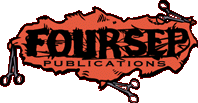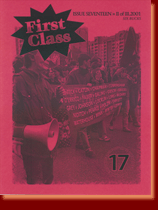


BLACKOUT
by Ron Gibson, Jr.
These days I can't help but notice the measured silence of drought. It's like death. I miss the singsong Northwest mantra of rain falling, ticking panes like time. Instead, the mountain reservoirs retreat from their shores, falling back over exposed stumps and Native American bones left naked by centuries of murder. Salmon dive suicidally headlong into turbines, ignoring fish ladders. And lights blink out in response; rolling brownouts becoming the West's version of Montezuma's Revenge. Everybody is paying their penance: inflated electric bills and reservation casino losses.
I can't seem to find any peace, anymore. My neighbor stops at the edge of our domains, his schnauzer shitting on the lawn (usually mine), to tell me he finds promise in a tax cut proposal, like his wife finds promise in goldenrod envelopes with Ed McMahon's likeness on the front. He then checks up and down our street, and when his conscience feels it is safe to cross, he confidentially whispers that the "niggers" are taking over our town. He warns that our property values will decrease and our crime rates will increase. And he keeps assuring my silent disdain with: "it's a proven fact." And I can't help but wonder what happened to the days when years went by without a word exchanged with my neighbors.
But now it's too quiet. Except for the television. News snippets show people flash anger over Boeing moving away, and I can't help but think it's time for me to do the same. Time to see what's past the dusty rain gutter and gray satellite dish rooftops. Time to canoe through Canadian-geese-shit-filled, man-made ponds, built inside overnight-raised apartment complexes. To see what's over that hill, where the landfill's methane gas torches blaze all day and night. Where 747's descend and sink into its fire; an illusion. But it's no magic. I know what is over that hill, past those freeway overpasses, past those sunset-stained copses hiding the vein of the Green River and traces of a dead serial killer. I know the unmarked territory where fourteen year old runaways age exponentially with each trick they turn, and which all-day-and-night-parked Winnebagos aren't filled with Okies, but meth labs. I know that Sea-Tac is waiting with a jet. A jet that will take me 20,000 feet into the atmosphere before my bladder bursts like an overfilled water balloon. All the Vicodin-popping parties in New York could not dissuade me of the facts.
So I look away from the edge of the sky, downward, and dig to discover suburban roots — petrified crabgrass, tupperware, and rusted Ford Fairlane hubcaps. The shovel dips and slices through the rich layers of wasted soil, where once this town grew out of to be a capital of agriculture and beer consumption. I hum the old Hamm's beer commercial. The one where the cartoon bear hits a homerun, and the Native American drum thumps hypnotically in the background, sent along with the affirming chant: "Hamm's, the beer refreshing. Hamm's, the beer refreshing. Hamm's." I dig past the splintered remnants of popsicle stick forts and lost pacifiers and melted army men and pet rocks and nickel-loaded fish hook containers and Black Cat firecracker duds. I dig until I stop to realize I don't know what I'm doing. I don't know what I'm looking for. I don't know what the purpose of this is, or better yet what the purpose of anything else is. All I see is emptiness around me. And when my neighbor spies on me through the crack of my fence, and declares that I need a city permit to dig in my own backyard, I accept it as a reprieve, throw down the shovel, and resign to a chair in front of the television.
I flip through the remote awhile before halfheartedly watching the lesbian relationship between Xena and her little poet mend. But I don't have enough time to worry if I'm just another A.D.D. addled Gen-X'er that hasn't read Douglas Coupland, when the power blinks off I imagine a huge map, the Western power grid, state connected to state, like firing circuits of the brain, all at once fading into night, like the dark clouds of disease on a CAT scan image.
But the seashell silence is broken with my neighbor's yelling. I look out my window, cast in the oily sheen of stars, and see his shadow rush inside his house. I can't help but notice the peaceful moments before he returns and unloads round after round at imaginary looters, like a paranoid banderillero on peyote chasing shadows of bulls. I duck down, quick, before his crosshairs catch my silhouette. In this dark, nobody's safe.
THE COAT
by Jane E. Polzin
Mostly she wandered. Then she sat at the counters and smoked. And smoked. She drank her coffee with plenty of sugar to get the full effect.
"I 'm the nervervous type," Sasha would say, talking loudly whenever she spoke, as if the tendency to tap her fingers and feet needed the explanation.
It was almost autumn and flies kept her company at the counter. And sometimes James would, too, with his huge, unhealthy belly pressing up against the counter and his big black crack showing from behind. He drank cup after cup, talking to no one in particular and swearing softly to himself.
After she left Aunt Jessie's Grill, the oldest restaurant in town and a firetrap at that, it began to rain. A soft sort of rain. The kind that's like a mist almost. Sasha wore a long, heavy camel wool coat. She had bought it during better times. It had cigarette burns on it right over her heart. Sasha put her butts out right over her heart. Then she'd put them in her black leather purse that had a gold chain shoulder strap. Another sign of better times.
"I only have 97 cents," she pleaded with Buddy when she arrived at his Breakfast Hut.
"Sorry, can't help you," he replied.
Knowing very well she needed three cents more, she left for the bus depot just a few blocks away. She knew somebody would give her some change. If she couldn't come up with the cash, she could get a smoke for free and sell it for a dime or a nickel at least.
"No! And don't ever ask me again!" said the first woman she approached. But another woman, who you could tell felt like she made some large charitable contribution to society itself, gave her a quarter.
"Let me see your change," Buddy's wife said back at the Breakfast Hut. Sasha held out a trembling hand as her coffee was being poured. "Fill it full," she encouraged.
She liked Buddy's sugar best in those large glass containers with the little flippy silver lids. You could get more sugar that way than with those annoying white packets.
Some people in a corner booth laughed loudly.
"It's not polite to laugh at someone," Sasha announced.
"It's not polite," she continued. The waitress interrupted-- "They're not laughing at you, Sasha," she said, trying to change the topic before things got hot.
Sasha thought about the people in the corner booth. If she had been at Jessie's, the people would have been laughing at James. The waitress would tell him, "Time to move on, James," when he downed his TCL - Three Cup Limit. Sasha rarely got the boot like James and Sam and occasional others. Her attention span was usually short. She would drink her limit and leave.
Sasha lived in a boarding house that had once been the home of a wealthy family. She lived on the third floor with three other women who shared a kitchen and bath.
"That's our one-assed kitchen," one of the other ladies told her when she moved in. Sasha was discouraged from using it, though, since she had almost started a fire once when she was cooking; she had left the kitchen to have a smoke in the hallway. Also, she didn't like that Girl Scout thing where you're supposed to leave whatever it is you're leaving in better condition than you found it.
Sasha's room had a bed, a dresser, a desk and a wardrobe. Above the desk was a calendar from the year before with a picture of a woman wearing a fancy felt hat with roses on it.
The landlady, who occupied the first floor, cleaned the rooms once a week and gave her boarders clean sheets and light blue blankets with burn holes in them.
The bath was down the hall. It had one of those old-fashioned tubs, the kind with the little feet. The floor had tiny marble tiles – some were missing – and there was a round brass plate covering a hole in the middle of the floor. Above the sink was a mirror with little flowers etched along its edges.
Sasha walked the long walk home in the rain. She climbed the stairs and went to her room, left unlocked. She carefully took off her coat and hung it on a hanger on the back of her bedroom door. She walked over to the window and lit a cigarette. Looking out the window, she heard the noise from the busy street below and watched the reflection of an empty sky in the mirrored windows of the office building across the avenue.
Sasha thought about the two men in her life. She was a graduate of a prestigious Midwestern university where she met Hal, who had left her. Another classmate, her friend Andre, had taken his life. Sasha returned to the dunes where they had last spent time together. She had written "Andre" in the sand with her finger and watched as the waves gently washed the word away.
She turned from the window and looked at the camel coat on the back of the door. She had worn the coat that day at the dunes. Now it was marred, black burn holes over her heart.
She searched her purse and pockets for change for tomorrow.